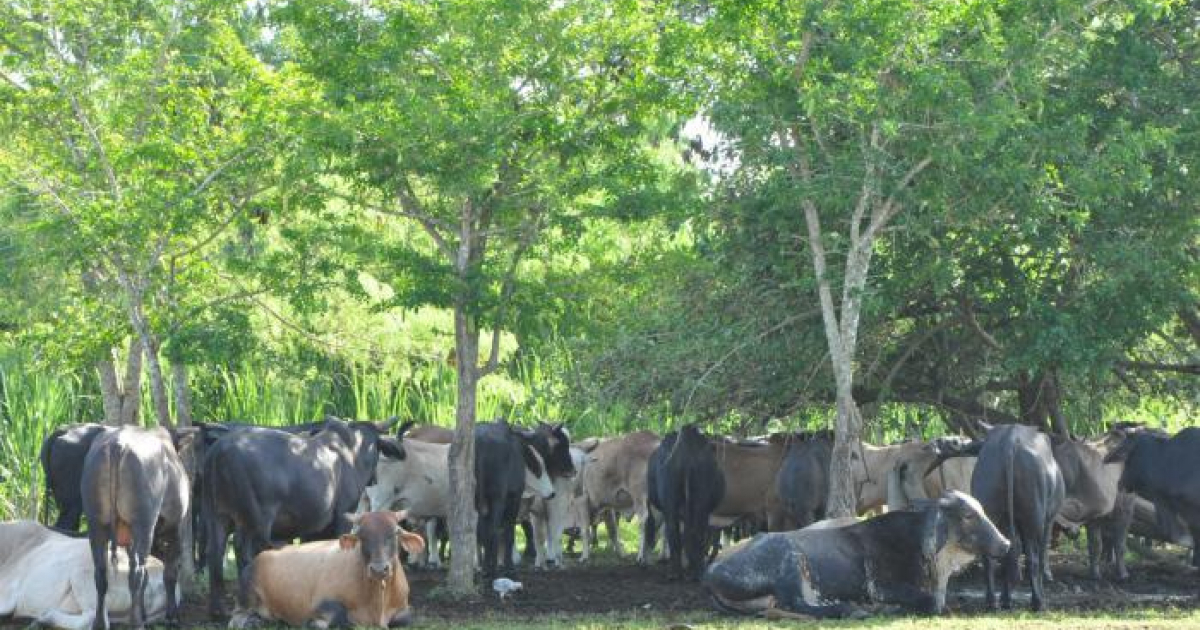
Camagüey, Sancti Spíritus, Las Tunas and Matanzas accumulated 7,647 thefts and sacrifices of livestock at the end of January, according to government figures, which recognizes its powerlessness to stop the crime wave with high prison sentences and blames private ranchers and state companies for the lack of control of their cattle.
The lack of control of the livestock mass by private cowherds and state companies, which carry out counts of cattle without the depth, frequency and responsibility required, are the main causes of the increase in thefts and illegal slaughter of cattle and horses, said the Ministry of Agriculture (MINAGRI), cited by the state newspaper Granma, and without referring to the chronic shortage of red meat that Cubans suffer and its high prices in dollarized stores for citizens' pockets.
At the end of January, Camagüey reported 235 thefts and illegal sacrifices (128 of cattle and 107 horses); Sancti Spíritus, 1,746; Las Tunas, 4,454; and Matanzas, 1,212, adding a total of 7,647 in those four Cuban provinces, according to data from the state newspaper Invader.
Idania Espinosa Pérez, specialist in Sanitary Control at MINAGRI, warned that illegally slaughtered animals can suffer from brucellosis and tuberculosis, very aggressive diseases for human health; a first because - until now - the Cuban government had not reported possible outbreaks of both diseases in cattle farming.
When a beef is killed in a hurry and in secret, there is a risk that the animals will not bleed properly, and the meat may become contaminated due to the proliferation of bacteria and microorganisms, Espinosa said, without reporting whether there have been cases of illness due to ingestion of meat from stolen and illegally slaughtered cattle.
Official experts, not identified by Granma, commented that it has not been possible to stop this violation despite the strong sanctions of the courts and recalled the damage to the economy and the decrease it causes in the Cuban livestock mass, without referring to the high mortality due to hunger, thirst and poor management. of the animals.
In Camagüey alone, a traditionally livestock province, 1,689 heads of livestock were stolen and slaughtered last year, according to data from Rubiseyda Martínez Aguilar, head of the provincial department of Livestock Genetics and Control, cited by Invader, which put the total number of dead cattle in the same period at more than ten thousand, due to malnutrition, lack of water and poor management; That is, six times more cattle die from hunger and inefficiency than at the hands of criminals.
In 2021, the government authorized the free sale and self-consumption of beef to Cuban ranchers, conditioned on prior compliance with sales to the State and provided that the livestock mass does not decrease, as part of 63 urgent measures to try to alleviate the food emergency.
The severity of the sentences for slaughtering large livestock in Cuba was modified upwards by the government in 1999, when article 240.1 of the penal code, still in force, was modified, breaking it down into the following cases, and then adding horses to these legal figures :
ARTICLE 240.1.- (Modified) Whoever, without prior authorization from the state body specifically empowered to do so, sacrifices larger livestock, is punished with deprivation of liberty for four to ten years.
2. Anyone who sells, transports or in any way trades in meat from illegally slaughtered livestock is punished with imprisonment for three to eight years.
3. Anyone who knowingly acquires meat from illegally slaughtered livestock incurs a penalty of deprivation of liberty for a period of three months to one year or a fine of one hundred to three hundred quotas or both.
4. Anyone who knowingly acquires meat from illegally slaughtered livestock to supply it to food processing, production, trade or sale centers incurs a penalty of deprivation of liberty for two to five years.
5. Anyone who, without previously informing the competent authority for proper verification, sacrifices larger cattle that have suffered an accident which makes their sacrifice essential, incurs a penalty of a fine of one hundred to three hundred quotas.
6. In cases of commission of the crimes provided for in this article, the court will impose, as an accessory sanction, the confiscation of property.
In 1999, President Fidel Castro Ruz said before the National Assembly of People's Power that society had to eradicate these crimes; Four years later, his brother and successor Raúl admitted that large sectors of society participate in the illegal slaughter of livestock, a crime with a long history in Cuba.
"The National Revolutionary Police (...) in close cooperation with political and mass organizations, has assumed (...) the task of definitively eradicating cattle ranching from the Cuban countryside, a crime in the execution of which they participate in complicity with the slaughterers. , heads and specialists of state companies, basic cooperative production units, small farmers, veterinarians and municipal directors and other officials of the institution that is supposed to ensure the growth of the livestock mass in the country," said an angry Raúl Castro, in 2003.
In 2015, the Cuban government amnestied 3,522 prisoners, following a visit by Pope Francis, but excluding those convicted of the crimes of theft, illegal slaughter, sale and receipt of beef and horse meat.
During the economic crisis of the 1990s, officially called the Special Period in Times of Peace, the slaughter of livestock was one of the most frequent crimes in Cuban courts, according to official data.
On May 17, 1962, Farmer's Day, Fidel Castro prohibited the slaughter of cattle, because it was necessary to "save our livestock wealth" to be able to produce "double, triple the amount of meat" in the future. Since then, the slaughter and private sale of beef has been made illegal; becoming 100% controlled by the Cuban State, until last year.
What do you think?
SEE COMMENTS (1)Filed in: